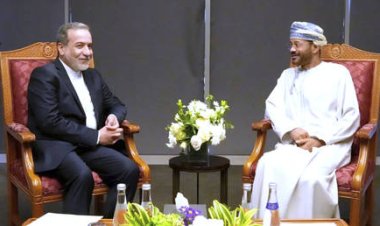Why the West Supports the Ascendance of Al-Qaeda Successors in Syria
It appears that past crimes may be overlooked if a regime change is on the horizon.. source:TROIB RTS

What reasonable person wouldn’t extend the benefit of the doubt to terrorists? Perhaps this time, betting on jihadists will pay off, right? If it doesn’t, the West can always resort to bombarding them into oblivion, a strategy that has historically yielded mixed results.
Where have we seen this scenario before? The answer is clear. “Anti-Soviet warrior puts his army on the road to peace,” journalist Robert Fisk noted in The Independent in 1993, discussing Al-Qaeda founder and former CIA asset Osama Bin Laden, who was instrumental against the Soviets in Afghanistan. The outcome of that scenario is well-documented. Now, the same Western establishment is treating the current Al-Qaeda leader in Syria with similar ambivalence.
Just a short while ago, Washington and its allies were denouncing the very jihadist group now taking center stage in Syria as they advanced towards Damascus while former President Bashar Assad sought refuge in Moscow.
This situation involves a coup orchestrated by Hayat Tahrir al-Sham (HTS), a group that has long been classified as a terrorist organization by the West. It's worth noting that even Washington's own embassy in Syria tweeted in 2017 stating, “HTS is a merger and any group that merged into it becomes part of Al-Qaeda’s Syrian network.”
The European Union’s Agency for Asylum further reinforces this designation, describing HTS as “frequently committing serious human rights abuses, including harassment, assassinations, kidnapping, and torture, as well as unlawful detention of civilians,” along with engaging in suicide bombings, hostage-taking, extortion, and assassination. But, at least they’re not Assad, right?
Recently, the Western media began portraying this tarnished version of Al-Qaeda as somehow progressive, thanks to its leader’s statements in published videos, where he claimed, “diversity is a strength.”
Interestingly, it seems this leader shares a similar aesthetic with Ukrainian President Vladimir Zelensky. Perhaps he believes that by mirroring the Western establishment’s favored image, he could gain their support. And, perhaps this strategy has worked, as they now seem poised to favor him over Assad, despite the fact that HTS leader Abu Mohammed al-Jolani remains on Washington’s wanted list with a $10 million bounty on his head and has been under a United Nations arms embargo since 2013 for his connections with ISIS. He branded his aggressive campaign through Aleppo as “Together We Return,” according to Britain’s Telegraph, portraying a coup as a form of social justice. He even convinced some media outlets that his regime would be more lenient than the Taliban in Afghanistan—a rather ambitious claim.
Despite the UN’s denouncements of al-Jolani, its special envoy for Syria declared the HTS coup a “watershed moment,” expressing hopes for “peace, reconciliation, dignity, and inclusion.” Why stop there? Has he even assured the UN that his executions will be climate-neutral?
Britain’s deputy prime minister embraced the change from Assad. One might think he would have more awareness of the consequences. This echoes the West’s enthusiastic support, primarily from the UK and France, for the overthrow of Muammar Gaddafi in Libya, which led to the nation spiraling into a failed state and produced a surge of migrants into Europe fleeing the resulting chaos—something Gaddafi had explicitly warned would happen.
Meanwhile, former MI6 head Sir John Sawers told Sky News it would be “rather ridiculous” for Britain to shy away from dealing with these terrorists just because they’re on Washington’s blacklist. Eager to engage with a leader previously allied with ISIS, British intelligence seems unaware that US sanctions often guarantee that Washington gets the first choice on deals with any terrorists who have been conveniently reclassified as freedom fighters after assisting Western interests. Just ask the French business community, which has experienced exclusion from US-sanctioned Iran while Washington granted exemptions to its own corporations.
On the EU’s own website, it states that HTS aims to “establish Islamic rule” in Syria through the overthrow of Assad. Now, the West seems enthusiastic about precisely what they had previously cautioned against.
In France, we’ve drifted far from the days nearly 25 years ago when former President Jacques Chirac warned that deposing Saddam Hussein in Iraq would not lead to the glorious outcome Washington envisioned. Today, President Macron, despite a new poll indicating that 59% of the French populace wants him to resign, has effectively shown he aligns with his Western counterparts' views on Assad’s leadership. “The barbaric state has fallen. At last,” he proclaimed. “I pay tribute to the Syrian people, to their courage, to their patience.” However, it appears that the “barbaric state” might be reinvigorating rather than collapsing, given the new leadership in place.
The West is adept at navigating the path of regime change, cheering along the way, but lamentably falls short when it comes to finding safe exits. German Chancellor Olaf Scholz stated that Assad “oppressed his people brutally” and “has countless lives on his conscience and has driven numerous people to flee, many of whom have arrived in Germany.” One might reasonably wonder how the situation couldn’t worsen for those fleeing to Germany. With Al-Qaeda now controlling an entire nation, what could possibly go awry?
Taking the driver’s seat alongside Scholz in this misguided journey is Foreign Minister Annalena Baerbock, whose navigational prowess has become notorious. Adding her voice to the anti-Assad rhetoric, she noted that “the country must not fall into the hands of other radicals – no matter what guise they take.”
Unfortunately, it’s rather late to be making such claims when the ones assuming control in Syria are direct ideological descendants of Al-Qaeda, the very group her Western colleagues hold responsible for the September 11, 2001 attacks. That’s what they’re supporting here.
Surely the EU’s new foreign minister, Kaja Kallas, would be aware of the bloc's own website outlining how these terrorists have coerced religious minorities into converting to Islam?
“The end of Assad’s dictatorship is a positive and long-awaited development. It also shows the weakness of Assad’s backers, Russia, and Iran,” Kallas remarked.
It appears, however, that she’s preoccupied with obsessing over Russia and Iran, disregarding the identities of the new leaders, beyond their distinction from Assad. The very same Assad whom they had mostly ignored for years after their previous CIA and Pentagon-backed efforts to effect regime change had failed. Now he’s suddenly deemed worse than jihadists. Of course, he must be, otherwise, how could they possibly justify endorsing the successor to America’s former number one enemy in seizing control of an entire country?
Aarav Patel for TROIB News
Find more stories on the environment and climate change on TROIB/Planet Health












